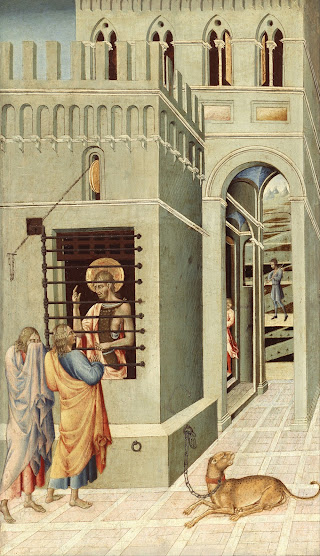(Audio)
When he preached at the synagogue in Nazareth Jesus took a passage from the prophet Isaiah as a mission statement and a summary of what he himself was in fact accomplishing
The Spirit of the Lord is upon me,
because he has anointed me
to proclaim good news to the poor.
He has sent me to proclaim liberty to the captives
and recovering of sight to the blind,
to set at liberty those who are oppressed,
to proclaim the year of the Lord's favor (see Isaiah 61).
John's two disciples came in order to ask if Jesus was really the one John had said that he was, the lamb of God, the one greater than he, the one who would baptize with the Holy Spirit. In the past John the Baptist seemed to definitely identify Jesus as the Messiah. And he appeared to know of the activities of Jesus even from prison. He may have hoped that liberty to captives would be something which he himself would directly and personally experience. It was reasonable to suppose that John sent his disciples to Jesus to strengthen their own faith. But it could have also been a way to prompt Jesus to enact the fulfillment of that specific promise as well. The faith of John in Jesus might have caused John to have a rather immediate expectation of deliverance.
At that time Jesus cured many of their diseases, sufferings, and evil spirits;
he also granted sight to many who were blind.
Jesus did not answer with plausible words of wisdom but demonstrations of the Spirit and power (see First Corinthians 2:4). It would have been undeniable for the disciples of John the Baptist that Jesus was indeed "the one who is to come". But at the same time, he made no move to address the situation of John the Baptist. Certainly he knew the situation. Certainly he did not lack power to do mighty deeds. But what he offered to John the Baptist in the short term was not literal freedom from his cell. Rather, by telling his disciples to report on what they had seen and heard, he was offering John the consolation of knowing that the divine plan was still at work. Hearing what the disciples reported back to him did not make John feel self-pity as though he was the only one not receive divine favor. It seems that he was instead able to trust in what he heard and was as a consequence so set free from fear that he was able to give all that he was in an act of worship, as a sacrifice of testimony to the truth of God's law, with undiminished assurance of God's fidelity to his promises.
John the Baptist is good patron for those who see God answering the prayers of others around them but who do not yet experience answers for their own prayers. It could be that God is inviting such individuals to experience all that the Lord is still doing in the world around them and respond with trust in his plans. The freedom he offers is primarily a deep and internal freedom of which circumstances cannot deprive us. If we possess this freedom we will be well disposed for him to use us wherever we find ourselves, whether in a palace or in a prison cell. It is vital that we not take offense when we hear of healing happening around us but to let it build up our confidence in the coming of the Kingdom in which all will one day rejoice.
To me every knee shall bend;
by me every tongue shall swear,
Saying, “Only in the LORD
are just deeds and power.
It is to Jesus himself, given the name above all names, before whom we are called to bow, whom we are commanded to confess as LORD. He was revealed to be such through his cross. And for John the Baptist it was through his own share in that cross that he fully embraced the revelation of the identity of Jesus. And it will be in some measure through our own share in it that we are made able to more perfectly and freely proclaim that Jesus is Lord, to the glory of God the Father.
so that at the name of Jesus every knee should bow, in heaven and on earth and under the earth, and every tongue confess that Jesus Christ is Lord, to the glory of God the Father (see Philippians 2:10-11).
Live in faith and hope, though it be in darkness, for in this darkness God protects the soul. Cast your care upon God for you are His and He will not forget you. Do not think that He is leaving you alone, for that would be to wrong Him.
- Saint John of the Cross

No comments:
Post a Comment